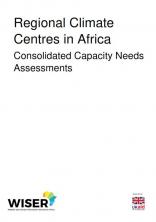Regional Climate Centers in Africa – Consolidated Capacity Needs Assessments

In the light of the enormous challenges climate variability and climate change pose to societies, there is an urgent need to enable African countries to provide the best possible climate services in support of climate risk management and adaptation. Climate relevant processes have strong inter-scale linkages going beyond borders of individual countries. As global-scale information provided by Global Producing Centres Supported by: Fund Manager: Delivery Partners: (GPC - coarse in terms of resolution and reflected features) is typically not sufficient for national-scale services, the concept of Regional Climate Centres (RCCs) was developed to bridge the gap between information at the global and national scales. Moreover, up-to-date climate services require, among others, appropriate computer power, modelling capacities and special expertise, to which not all African countries currently have adequate access. In this respect, RCCs offer excellent opportunities for networking and pooling the capacities of National
Meteorological and Hydrological Services (NMHSs) in the region in order to enable each NMHSs to provide the full suite of climate services to meet national needs.
RCCs are centres of excellence that create regional products, including long-range forecasts, that support regional and national climate activities, and thereby strengthen the capacity of countries in a given region to deliver better climate services to national users. Serving as a backbone for NMHSs’ climate activities, RCCs contribute to capacity-building of NMHSs and sustainable development within countries. RCCs further support NMHSs in implementing and maintaining climate services by regionalizing global climate products and introducing innovative regional products, helping to access and apply tools, such as software and models, for regional and national analyses and applications, offering infrastructural support such as archiving services, stimulating the development of a regional research and development agenda, conducting training and promoting resource mobilization.